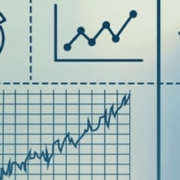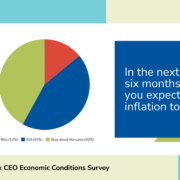COVID Made the Economy Sick, Government Made It Worse
 By Kurt R. Bauer, WMC President and CEO
By Kurt R. Bauer, WMC President and CEO
Last year in this annual forecast, I predicted that the COVID-19 vaccines would ease the stranglehold the virus had on the economy. I also predicted that then President-elect Joe Biden would govern to the political and economic left of Barack Obama. I think both predictions have largely came to pass. But even with the vaccines, boosters, and therapeutics, COVID-19 will still cast a foreboding dark cloud over the economy in the New Year, as will the Biden Administration’s policies.
There is a cause and effect for everything. COVID-19 caused state governments to order the first ever large-scale shut down of huge swaths of the U.S. economy. That caused a recession and businesses responded by cancelling orders for goods and services that ultimately impacted critical links in the U.S. and global supply chain.
At the same time, the federal government was passing massive, multi-trillion dollar COVID relief packages that stimulated consumer demand for just about everything once the worst of the pandemic appeared to be over. But the damage had been done.
Plants throughout the world that make the things we want — from cars to refrigerators — or make the things that go into the things we want — from microchips to steel — had slowed or idled production. Resuming pre-COVID production levels to meet the sky-high demand isn’t as easy as flipping a switch. And even if factories could keep up with demand, the transportation system that delivers those goods to market couldn’t. That includes shipping, rail, and trucking.
It’s like what happens when there is a car crash on a busy multi-lane highway during rush hour. Traffic slows to a trickle while the accident is cleared. And even after all lanes are reopened, it takes time for normal flow to resume. COVID is the car crash. The highway is our economy. And traffic is the supply chain.
Two other major “effects” caused by the pandemic are workforce shortages and inflation.
On workforce, far fewer Americans, including Wisconsinites, are working today than pre-COVID. Some of the federal stimulus is to blame, especially the American Rescue Plan passed last spring when the economy was already on the mend. Incentives matter and when you pay people not to work by supplementing state unemployment benefits, don’t be surprised when some don’t. The good news is that job numbers from late last year appear to show people returning to work, albeit slowly.
And all the trillions of dollars in federal stimulus compounded by more demand for goods than supply is causing inflation, and it doesn’t appear to be “transitory.” For example, wage inflation is certainly not temporary. Wages and benefits are rising because of the labor shortage and, unlike the price of groceries, the cost of hiring is unlikely to drop. We are setting new baselines.
Energy is similar. I don’t see energy prices dropping any time soon because of the anti-fossil fuel policies of the Biden Administration. Alternative energy is much more expensive to produce than energy generated from domestically produced fossil fuels. Alternative sources are also intermittent and not easily stored. And rising energy prices at both the pump and for home heating are very regressive. That’s why economist Thomas Sowell calls inflation “the most universal tax of all.”
What could make it all worse is President Biden’s proposed Build Back Better (BBB) budget reconciliation bill, which at press time has passed the U.S. House, but not the Senate. There are many things to dislike in the $1.75 trillion package, including raising individual income taxes. But every Wisconsinite should know that the BBB package passed by the House includes $280 billion in tax relief intentionally targeting millionaires and billionaires in “blue” states, like New York, New Jersey, California, and Connecticut.
Other BBB provisions will add more mandates, entitlements, disincentives to work and regulations that will raise the cost of doing business in every major category. Typically, you don’t respond to a major national crisis that led to a recession by raising taxes and adding other expenses on the private sector.
All of the above is creating paralysis and uncertainty. Businesses can’t find workers. They can’t get components. They can’t ship products. They don’t know how much their taxes will go up. They don’t know how high energy prices will go. They don’t know how many new entitlements they will be mandated to provide employees. They don’t know how many employees will quit if the vaccine mandate goes into effect. And they don’t know how governments around the world will react to new COVID-19 variants, like Omicron.
The bottom line is that COVID-19 made the economy sick and government is making it worse.
—
Founded in 1911, Wisconsin Manufacturers & Commerce (WMC) is the combined state chamber of commerce, state manufacturers’ association, and state safety council. With nearly 3,800 members, WMC is Wisconsin’s largest business association representing employers of all sizes and from every sector of the economy.






